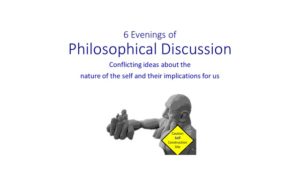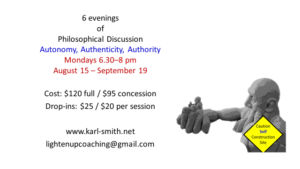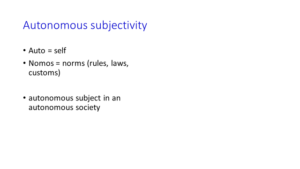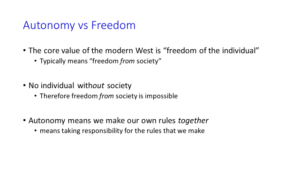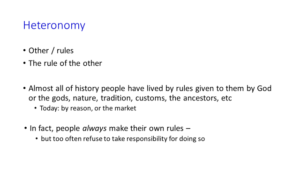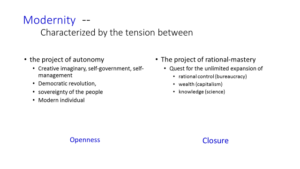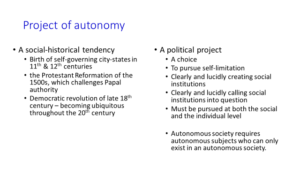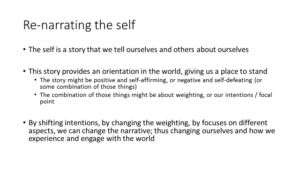We ended last week with this slide, and agreed to follow it up this week. It has since occurred to me that in my original promotional material I promised that we would discuss at least one of the key ideas of narrative therapy: re-narrating the self. I don’t think I can do justice to both of these ideas tonight, so I will follow through with our discussion from last week on autonomous subjectivity, and make a few comments about re-narration if there is time. I’m happy to make time to follow up one-on-one to discuss re-narration if anyone feels particularly let down.
Last week I showed you the book Cornelius Castoriadis: Key Concepts, from which much of our discussion of the Psyche was drawn. I’m not going to draw so heavily on it this week, but just note that the first two chapters are titled Autonomy (by my friend Suzi) and Heteronomy (by moi).
We have previously noted that whereas autonomy literally means self-norms, or rules and laws, heteronomy means the norms of the other. We started to get into this last week, but were slightly side-tracked by the defining characteristics of modernity.
Let’s begin by clarifying those terms and ideas, and then see if we can delve deeper into an understanding of autonomy. Let me begin by highlighting one of the great complications of this idea of autonomy – that we are interested in autonomy for us as individuals, but can only achieve it in a society which values and pursues autonomy for everyone. That is, I cannot be autonomous unless you are too.
This is the beginning of understanding the important difference between autonomy and freedom.
When we talked about socialization last week, we explored some of the issues around a tension between openness and closure. We said that the defunctionalized psyche is an unformed flux which must form itself, and seeks closure upon itself, but which can only close itself by opening itself to the world around it, a world which includes other people.
To different extents, in varying degrees, we continue to rebel against the inevitability of the presence of others; we want to close upon ourselves. But we also find that other people are good for us; useful, if not essential. Consider the irony of massive societies of free individuals who each identify and define themselves by their differentiation, by the ways in which they differ from one another. We live in societies with millions of people who each, at some time or another, wish that everyone else would just fuck off and leave us alone.
That’s not a universal human characteristic, though – it’s really only a tendency of those of us who have internalised the western construct of the autonomous individual as free and independent. There is heaps of solid research as well as endless anecdotal evidence of different cultures being significantly differently oriented along the spectrum running from individualism to groupism or collectivism.
Yet these categories of individualism and groupism are stories (or, in Castoriadis’s terms, social imaginary significations – there’s a chapter by that name in the Key Concepts book, too); yes they are stories that represent some genuine differences in tendencies – in weighting and valuation of certain modes of interacting with one another. Yet still in the most collectivist society there is a sense of individuation, just as in the most individualistic societies there is a great deal of cooperation and collective action.
When we talked about socialization last week, we said that the unformed psyche must look outside of itself for the forms with which to form itself. It finds these forms in a particular society, a particular culture and a particular set of social institutions, including the language with which we construct and maintain our social norms, laws and institutions. It is only through forming itself in accordance with, in opposition to, with and through these forms that the unformed psychic flux assumes the form of a particular kind of social individual. In short, we become social individuals as a product of the interaction between our psyche and our society.
It is therefore non-sense to speak of an individual free from society. Of course there are outlaws – those who live outside of social … laws? But even they engage in a sort of dialogue with the laws, or at least with the norms of some particular group of people. Before you begin to cite exceptions, like the swamp rats in Louisiana or the bushmen in central Australia, lets add the codicil that to the extent that there are some people living outside of the law, who might or might not prove to be an exception to these characterizations, they have nevertheless at some stage internalised the discourses of the other – if nothing else, in the modern nation-state, to be an outlaw for any length of time requires knowing what laws you are outside of, and knowing how they are instituted and enforced in order to successfully negotiate your way around them.
In short, for the people with whom we are concerned, being autonomous means making our rules and laws for ourselves, together. Ostensibly, we are engaged in this process when we go to the polls next week. We need not debate how true to the ideals of democracy our system is to acknowledge that it is the predominant story that we tell ourselves about how our government ought to be formed.
But even though this is indisputable, it is nevertheless challenged by the tendency towards closure.
Some Castoriadis scholars have observed that treating autonomy and heteronomy as polar opposites – as Castoriadis is prone to do – is an oversimplification. In ideal terms, of course, they are mutually exclusive, incompatible, and cannot co-exist. But in real terms, as we go about our everyday lives, we get involved in negotiating and instituting the laws or rules – sometimes in a larger social context such as electing the various levels of government, but also in our private and personal interactions – and in these interactions there are frequent trade-offs.
That is, in our interactions with others, in the street, at work, at home, we frequently compromise on some of the rules that we live by. In the process of living a life in which we participate in making the rules and laws that we live by we find ourselves living by rules that other people make. At best it’s a trade-off. But it can be a situation of domination or coercion by other means – manipulation, exploitation and so on.
And in fact we find this is all too often the human norm. In response to our questions which challenge the authority by which they dominate (control, exploit etc), oppressors and exploiters have told a bunch of stories that attribute their authority to God or the gods, to the ancestors, or parents, the spirit beings, and more recently the laws of the market, or reason, nature, etc.
Castoriadis describes this as a refusal to take responsibility for the laws that we live by, but there is also a more complex power dynamic here. If I tell you that you have to pay taxes to me because god says cough up 10% for the greater good, and god says I’m in charge of looking after the greater good, you can’t question that – unless you question god’s will, or my knowledge of god’s will.
In short, if I can convince you that my actions are authorized by the highest untouchable authority, then you can’t refuse. I’ve previously mentioned that some scholars have argued that religion was originally institutionalised simply to provide an unquestionable authority for the formation of the state – whether in the form of a monarchy, an empire, a dictatorship etc (see Marcel Gauchet, The Disenchantment of the World: A Political History of Religion). This is what is inferred in things like the divine right of kings, but appears in other places as the divinity of the kings (pharaohs, Japanese Emperors, etc).
But despite those manoeuvrings to provide solid foundations for the law-givers, a closer examination of everyday life practices reveals that, in fact, people always and everywhere create their own laws, at the very least in choosing how to adapt to and work-around the law that is given.
Some concrete examples of this process include:
We might consider the gay rights/queer/LGBTQI movement in a hetero-normative society as an example (as many examples?) of people creating their own norms and practices. The successes of this movement are inseparable from the collective nature of the movement, but to a significant extent the movement is an expression of the coalescence of the non-conforming actions and identities of social actors.In a society where cohabiting breeding partnerships ares the norm, increasing numbers of people are creating different forms of relationships and households: Choosing to not have children, to remain unmarried, and living together apart as some examples. Note that although some of these choices have become more commonly accepted, perhaps even uncontroversial, that’s a sign of society changing its norms in response to the autonomous choices of its citizenry.Where life-long monogamy continues to be the norm — or at least the idealised norm — serial monogamy, polyamory and other non-complying practices are explored outside of the mainstream culture or the formal legal system.Where mass-production and consumerism are the norm, autonomous responses including minimalism, recycling, freecycling etc.Of course there is also a downside to this, such as politicians who push the boundaries of acceptable fund-raising, share traders who cross the line of insider trading, property developers who game the system and so on.Now that we’ve into activities with questionable legal status, we might add recreational drug use and the underground economy as further examples. But recall that the practices invoked in the first examples were also illegal not too long ago in Australia, and continue to be outlawed in other places today.
The extreme case to demonstrate that people always make their own laws or rules is that of the slave, for whom rebellion or disobedience is punishable by death, but who nevertheless has the power to choose that path.
It’s also important to emphasize that although we always make our own rules, it is not always under circumstances of our own choosing. Using the same example, a slave may choose to comply and obey rather than to die – or vice versa – but did not create the circumstances under which this became his or her options.
Similarly, we might say that under colonialism there were people who were subjugated, and thus not able to enjoy the self-governance of autonomous citizens. Some people collaborated with the colonizers, some rebelled against them and others just did what they had to to survive. A significant portion of those populations would say that their choices were determined by fate, by necessity, by coercion. That is, their stories are that they only did what they had to do; they are not responsible for the choices that they made under those circumstances.
Castoriadis’s discussion of autonomy must be seen against this light. I’ll come back in a minute to talk about autonomy as a process of self-limitation and taking responsibility for these limitations in a moment. But it’s also important to distinguish a society making laws for itself and an individual making laws for herself. So let’s look at the context of the society in which we live, in order to better understand the structures that support and advance a project of autonomy and those that oppose or constrain it.
This idea was introduced last week, in reference to an article that I wrote about Castoriadis and the modern world (‘The Constitution of Modernity: A Critique of Castoriadis’ European Journal of Social Theory, 12(4)).
Castoriadis argues that the modern world is constituted in the tension between the project of autonomy and the project of rational-mastery. As you can see in the slide, I’ve indicated that these correlate to the tendencies between openness and closure, which is the same as the tension we were discussing at the level of the psyche – being open to the world around us, open to receiving, learning, interacting, engaging and being instrumentally engaged in the world in the actions and interactions required for meeting our needs. It’s quite similar to the surging forth of the creative imaginary of the id and the controlling, negotiating, compromising social institution of the ego.
In modernity both of these tendencies have been unleashed from the constraints of traditional authority. Castoriadis sometimes seems to under-estimate or downplay the extent to which these two competing projects are intertwined. Undoubtedly, much of the drive for rational-mastery is found in the quest for autonomy – we seek wealth and rational-control and greater knowledge all in the interests of enhancing our quality of life (in this sense, then, the parallels to the id and ego are overdrawn – but as we’ll see shortly, they are elsewhere very helpful). The central idea of the modern western individual is of the autonomous self-governing individual who can participate in the collective governance of our society. This coincides with a gradual move over 500 years that has become the unquestionable norm – the establishment of the democratic self-governance of a sovereign nation.
But while this has become the norm, it was neither inevitable, nor does it mean the same thing everywhere you look. There’s a huge body of research that questions the early modernist idea – the Eurocentric imperialist idea – that globalisation would mean the convergence of all of the world’s diverse societies towards a single ideal or model of governance, participation, industrialization, style of living, standard of living and so on.
That was the mainstream theoretical and political consensus among western scholars and politicians for most the 19th and 20th centuries – it included all of the justifications for empire building and proselytizing the (Western) civilizing process.
But we found that ours is merely one of many civilizational orientations, and that other civilizational and cultural constellations have adopted and adapted to the twin tendencies of modernity in their own ways.
What is most relevant for our purposes, I think, is that if we are using any of these distinctions by way of trying to find a good balance between these two poles of openness and closure, between autonomy and rational-mastery, we need to focus on questioning the ways in which the society has created and maintained institutions of democratic participation – the extent to which the people are empowered and enabled to speak up and call the existing laws, rules, norms and political processes into question.
To be sure, rational-mastery and organisation are not problematic in themselves, they are problematic when driven by the quest for unlimited accumulation – whether of knowledge, power or wealth. In contrast to contemporary consumer capitalism with its demands for unlimited growth, an autonomous society would be one which clearly and explicitly sets limits upon itself. An autonomous society is one that is self-limiting.
In our discussion last night, someone observed that a society defined by the tension between these two projects would be quite a positive development compared to where we appear to be headed in the Anglo-sphere these days. As we untangled that observation, we were reminded of the increasingly plutocratic character of contemporary capitalist societies. We noted that the plutocrats, the religious right, and their lackeys are just as opposed to the project of rational-mastery as they are to the project of autonomy. They are dismantling the bureaucracy and dismissing scientific knowledge as they continue to accumulate wealth and power. In short, Castoriadis’s polarization of two tendencies looks increasingly unconvincing as other forces in this field of tensions arise and become more dominant.
It might seem like an overly academic approach for our purposes, but it’s worth considering the two different ways that the term “project of autonomy” is used in Castoriadis’s work, in order to get a clearer idea of what we’re dealing with here. If we don’t look at these carefully, it is too easy to slip into the problematic idea that the quest for autonomy is some natural human disposition – much like the Bush government pretended that the Iraqi and Afghani people had an inner democratic nature that merely needed to be unleashed.
In other words, I want to caution against assuming that the quest for autonomy is natural or automatic. Paradoxically, I also think it’s worth considering it as a recurring tendency of the human animal – one that does not directly correspond to either the tendency towards openness or closure, but rather criss-crosses those tendencies and fuels the see-sawing between them.
Anyway, when Castoriadis defines modernity in terms of the project of autonomy, he’s referring to a social-historical tendency – he’s describing something that has happened in history. He says it has only come to the fore twice – first in Ancient Athenian society (around 600 bce) and next in the Modern West – beginning around the 11th century, taking a great leap around the beginning of the 16th century, and coming to fruition from about 1800 until the beginning of WWII. He characterizes western modernity after that as retreating into conformity – which is to say that the other characteristic tendency, the quest for the unlimited expansion of rational-mastery has come to dominate in the latter half of the 20th century.
This is a contentious claim, which we could discuss and dispute until the cows come home. Whether that’s correct or not, the main point is that the effort to create autonomous societies – to institute and defend autonomous modes of subjectivity and citizenship – is clearly discernible in Western history. So is the tendency to undermine or override efforts towards autonomy – evident in the demands that our laws conform to some extra-social force, such as a god, or the laws of nature, or the invisible hand of the market.
That’s the one way to talk about it – something that has happened, which provides us with evidence that this thing is possible.
The other way that Castoriadis talks about it is as a political project, something to be embraced and promoted. He emphasizes that this project is not necessary. Nor is it inevitable. It is not a seed in the human psyche awaiting the necessary conditions to germinate, sprout and grow. It is a way of organizing society that we choose to pursue – and we choose it because it seems to us to better than the alternatives.
We choose to pursue this project because it is apparent to us that societies always create their own norms, laws and rules – and therefore they ought to take responsibility for doing so. We choose to pursue this project because it is apparent to us that the pursuit of the unlimited expansion of wealth and control is destroying both the planet’s natural resources and the achievements of civilization – ripping apart the social fabric of a fair and just society.
It is apparent that peaceful coexistence and environmental sustainability are only achievable if we collectively agree to impose limitations upon ourselves, limitations which govern how we consume resources and how we relate to one another.
From this perspective, then, the unlimited expansion of capitalist accumulation appears to be the id unleashed. An autonomous society operating within the constraints of self-limitation appears to be nothing more wondrous, then, than a mature and well-developed ego. It must be a society in which the citizens accept the necessity and therefore the constraints of living with other people – accepting that some form of governance is essential, and therefore the best type is one that is instituted in such a way that we can continue to discuss the rules that we live by – instituting them and calling them into question through peaceful dialogue.
Now let me see if I can segue back to re-narration from here.
This podcast http://www.npr.org/programs/invisibilia/ provides a brilliant case study of a collective re-narration, although the process is not discussed in those terms. It begins with a discussion of the development of emotional intelligence among the hard men on a Louisiana oil rig – men who were dragged kicking and screaming into the transformational process, who found their family and working lives entirely transformed when they were taught how to open up, get in touch with their feelings, and trust one another with their vulnerability. I find it a very uplifting story of the capacity for change.
But let me share a couple of simpler anecdotes that might help to illustrate the transformational potential of re-narrating our story.
I was speaking to someone who identifies herself as an introvert. According to her story: her natural tendency, if left to her own devices, would be to close herself off in a small apartment, where she could keep everything in precise order and have minimal contact with other people. She recognized this tendency in her early teens, and has since then made concerted efforts: to ensure that she always lives with other people; to ensure that she has regular engagements with others, at work and at home; to share her household with others so that she must be accommodating and at least somewhat social.
I’ve heard this story several times. I eventually pointed out that in this story she identifies as the introvert who would live in isolation. That’s who she is, she says. I have never heard her acknowledge that she is (also) the person who is determined to live with others, to be sociable, to work with and interact with other people. I have watched her engage at parties, or with small children – and those performances bear no resemblance to the “I” as an introvert in the story.
Recognizing this can help to shift the emphasis of the story. She might come to recognize that she is both the introvert who wants to be left alone and a social animal who enjoys interacting with others. With that recognition, the stresses of social interaction might be reduced; the need to engage with others become less of a burden.
In a hypothetical case, we imagine a person who says every night “I’m going to quit smoking tomorrow” but continues to smoke. It is all too common for people going through this cycle of trying to quit smoking (or drinking, or taking drugs) to equate this failure with their “self” – to segue from the statement “I failed to quit smoking” into the statement “I am a failure”. When dealing with someone with this story, it is helpful to draw out other aspects of their lives – perhaps they’re being recognized for a great job at work, or they are successful at building and maintaining personal relationships, or they produce fabulous art or craftwork. Identifying their strengths can go a long way to shifting the narrative; compartmentalizing that failure in such a way that it is reduced, put in perspective. In a sense, this is a process of editing the narrative, to bring to the fore their strengths and successes, to shift their self-image, and their self-esteem. The new story might go something like “well I’m having difficulty quitting smoking, but I’ve got a lot of stuff going for me. People like me, I’m good at my job; except for the smoking life is good.” With a new story like that, we might find a wave of successes that are recognized by both the self and others proves empowering enough to finally quit smoking. But even if it doesn’t, the burden of failure has been lifted.
